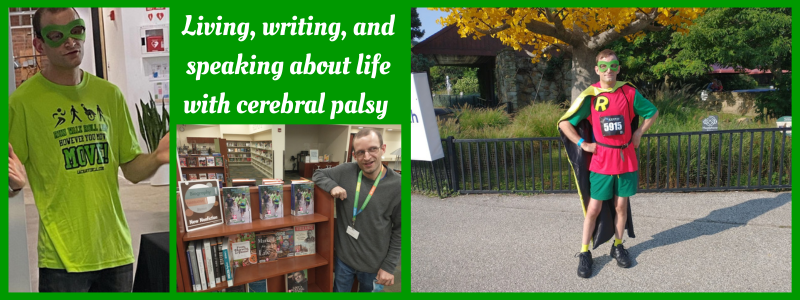Instantly after hearing the words, my mouth twitched. Hesitancy grasping me. Should I say something? The comment possessed innocent intentions, a compliment in fact. Yet the wording emboldened disability stereotypes.
“Zach is the most non-disabled, disabled person I’ve met.”
Even sharing the story here leaves me feeling guilty. The person who said that meant well. Again, complimenting me. Not in a backhanded way either, but rather offering genuine admiration.
Pointing out the fault would make me seem ungrateful. Or worse, hypersensitive. The latter remains worse since I might scare the commenter into silence. The person now fearful further comments will set off additional conversational landmines.
Nonetheless by keeping quiet, I neglect my mission as “The Cerebral Palsy Vigilante.” To fight against cerebral palsy misconceptions. Take a stand opposite disability stereotypes.
“What Disability Stereotypes?”
“What disability stereotypes?” you may ask. Well, probably not you particularly. I am confident most people reading my blog retain enough familiarity with disabilities to understand where the flattery went awry. How about we reveal the issue together on three? One, two, three!
Describing me as “non-disabled” because I live an active lifestyle reinforces the idea people with disabilities live sedentary lives. Sitting around all day sad. Desperately daydreaming, pondering “What if I didn’t have this diagnosis?” Altogether living a woeful existence.

Admittedly, some in the disability community live this way. Although, I firmly believe the lifestyle results from a self-fulfilling prophecy influenced by larger societal stigmas surrounding disability. Hence the importance to address disability stereotypes when they reveal themselves through everyday conversation.
Like Walking On Ice
Addressing these disability stereotypes nevertheless requires delicate concentration. Like walking on ice! One false move and down you go. A mistake in word choice and SPLAT! You end up facing the previously mentioned possibilities. Seemingly ungrateful at best and hypersensitive at worst.
“I don’t want to say anything” I slowly sputtered, carefully trying to strike a balance between empathetic and educational.
“What did I say wrong?” came the concerned follow-up.
“Describing me as ‘non-disabled’ because I live an active lifestyle” I began explaining, “emboldens disability stereotypes that living with a disability means living a sedentary lifestyle.” Whether my explanation proved adequate I wish I could say for certain. Regardless I figured telling the tale via a blog post increases the chances somebody benefits from the exchange.
Not Alone
I am thinking the encounter I detailed today gave you flashbacks. Triggering an old memory. A time disability stereotypes unveiled themselves during your own everyday conversation. Please share!
Comment below to recount. What disability stereotype confronted you? How did you respond? I look forward to reading and replying to your experiences.
Until next time, remember. Don’t blend in. Blend out!
-Zachary



The common stereotypes placed on the disabled community can
be perceived as inferiority, vulnerability, incompetency, and appearing inept or pitiful. Because these stereotypes exist, society tends to rank disabled people at its bottom
I agree Sarah. Thus why dispelling these stereotypes remains so important!